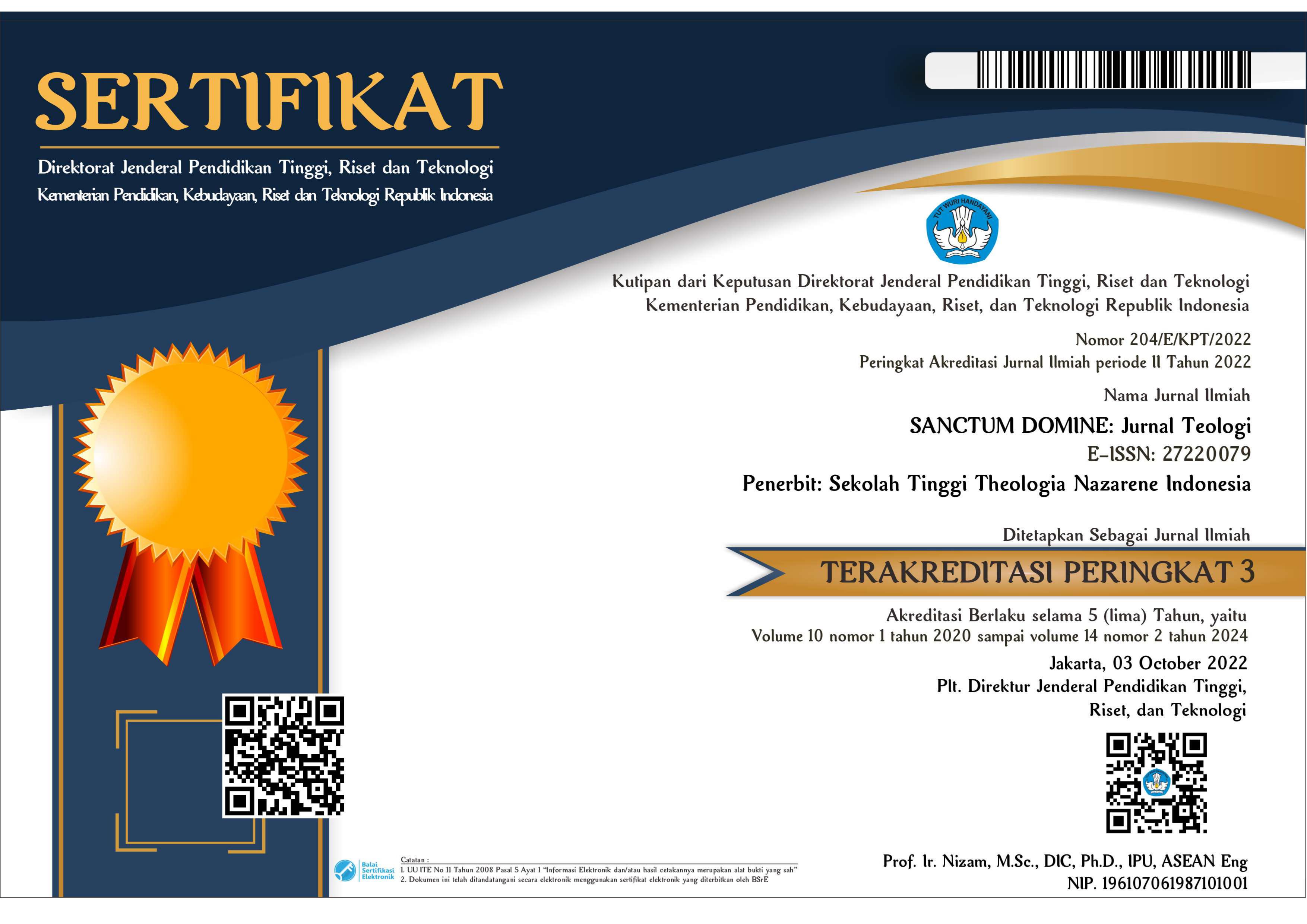Is it true that the Third Servant is Lazy and Wicked?
Critical-Alternative Readings of the Parable of the Talents in Matthew 25:14-30
Abstract
The “classical” reading of Matthew 25:14-30 has always referred to the third servant as being unfaithful to his master and to what his master entrusted to him. “Talents” are always considered as “gifts” given by God that must always be developed by human. This reading also “seems” to negate the objections that appear in the text, when the third servant gives resistance to the master. But does this parable really show that the third servant is lazy and wicked, and does it really “only” speak of God’s gift? This paper will present a critical-alternative reading of Matthew 25:14-30. Using the narrative approach method, there are at least four readings of this parable, which are (1) Jesus is/was doing the third servant; (2) the third servant is a good servant; (3) this parable is not about gifts; and the possibility that (4) Matthew’s Gospel is “hiding” something; that the answer to the parable in Matthew 25:14-30 is in Matthew 25:31-46. That is why the parable of the talents must be read together with the story of the last judgement.
References
Adamczewski, Bartosz. The Gospel of Matthew: A Hypertextual Commentary. Oxford: Peter Lang Edition, 2017.
Arifianto, Yonatan Alex, Carolina Etnasari Anjaya, and Andreas Joswanto. “Kajian Teologis Atas Konsep Otoritas Dalam Matius 25:14-30 Dan Refleksinya Bagi Kepemimpinan Gereja Era Digital.” CHARISTHEO: Jurnal Teologi dan Pendidikan Agama Kristen 2, no. 2 (March 6, 2023): 167–180. https://e-journal.anugrah.ac.id/index.php/JCH/article/view/114.
Basser, Herbert W., and Marsha B. Cohen. The Gospel of Matthew and Judaic Traditions: A Relevance-Based Commentary. Leiden: Brill, 2015.
Beavis, Mary Ann. “The Parable of the Talents (Matthew 25:14-30) - Imagining Slave’s Perspective.” Journal of Gospels and Acts Research 2 (2018).
Blajer, Piotr. “The Parable of the Pounds or Talents: One Story in Two Different Contexts.” Liber Annuus 63 (January 2013): 275–292. https://www.brepolsonline.net/doi/10.1484/J.LA.5.105597.
Blomberg, Craig L. Interpreting the Parables. Downers Grove: InterVarsity Press, 2012.
Card, Michael. Matthew: The Gospel of Identity. Downers Grove: InterVarsity Press, 2013.
Chenoweth, Ben. “Identifying the Talents: Contextual Clues for the Interpretation of the Parable of the Talents (Matthew 25:14-30).” Tyndale Bulletin 56, no. 1 (May 1, 2005). https://tyndalebulletin.org/article/29194-identifying-the-talents-contextual-clues-for-the-interpretation-of-the-parable-of-the-talents-matthew-25-14-30.
Cooper, Ben. Incorporated Servanthood: Commitment and Discipleship in the Gospel of Matthew. London: Bloomsbury, 2013.
Davies, Margaret. Matthew. 2nd ed. Sheffield: Sheffield Phoenix Press, 2009.
Van Eck, Ernest. “Do Not Question My Honour: A Social-Scientific Reading of the Parable of the Minas (Lk 19:12b–24, 27).” HTS Teologiese Studies / Theological Studies 67, no. 3 (March 9, 2011). http://www.hts.org.za/index.php/HTS/article/view/977.
Evans, Craig A. Matthew - New Cambridge Bible Commentary. Cambridge: Cambridge University Press, 2012.
France, Richard T. “Injil Matius.” In Tafsiran Alkitab Abad Ke-21 - Matius-Wahyu, edited by H. A. Oppsunggu, 46–101. Jakarta: Yayasan Komunikasi Bina Kasih, 2017.
———. “On Being Ready (Matthew 25:1-46).” In The Challenge of Jesus’ Parables, edited by Richard N. Longenecker, 177–198. Grand Rapids: William B. Eerdmans Publishing, 2000.
———. The Gospel According to Matthew. Grand Rapids: William B. Eerdmans Publishing, 1985.
Garland, David E. Reading Matthew - A Literary and Theological Commentary. Georgia: Smyth & Helwys Publishing, 2001.
Giambrone, Anthony. “A Note on Luke’s Parable of the Minas and the Ancient Practice of Burying Coin Hoards.” New Testament Studies 65, no. 4 (October 6, 2019): 589–597. https://www.cambridge.org/core/product/identifier/S0028688519000195/type/journal_article.
Gittins, Anthony J. Ministry at the Margins - Strategy and Spirituality for Mission. Maryknoll: Orbis Books, 2004.
Green, Joel B. The Gospel of Luke - The New International Commentary on the New Testament. Grand Rapids: William B. Eerdmans Publishing, 1997.
Hagner, Donald. Word Biblical Commentary – Matthew 14-28. Dallas: Word Books Publisher, 1995.
Hultgren, Arland J. The Parables of Jesus - A Commentary. Grand Rapids: William B. Eerdmans Publishing, 2000.
Johnson, Luke Timothy. The Gospel of Luke - Sacra Pagina. Collegeville: The Liturgical Press, 1991.
———. “The Lukan Kingship Parable (Lk. 19:11-27).” Novum Testamentum 24, no. 1 (1982): 139–159. https://brill.com/view/journals/nt/24/1/article-p139_10.xml.
Ladd, George Eldon. The Gospel of the Kingdom - Scriptural Studies in the Kingdom of God. Grand Rapids: William B. Eerdmans Publishing, 1986.
Luz, Ulrich. New Testament Theology - The Theology of the Gospel of Matthew. Cambridge: Cambridge University Press, 1995.
Mitch, Curtis, and Edward Sri. The Gospel of Matthew – Catholic Commentary on Sacred Scripture. Grand Rapids: Baker Academic, 2010.
Montanari, Franco. Greek English - The Brill Dictionary of Ancient Greek. Leiden: Brill, 2015.
Nolland, John. Word Biblical Commentary – Luke 18:35-24:53. Dallas: Word Books Publisher, 1993.
Pennington, Jonathan T. Heaven and Earth in the Gospel of Matthew. Brill: Leiden, 2007.
Porter, Phillip. “The Parable of the Talents (Matt 25:14–30).” Novum Testamentum 63, no. 2 (March 17, 2021): 159–176. https://brill.com/view/journals/nt/63/2/article-p159_2.xml.
Schottroff, Luise. The Parables of Jesus. Minneapolis: Fortress Press, 2006.
Schultz, Brian. “Jesus as Archelaus in the Parable of the Pounds (Lk. 19:11-27).” Novum Testamentum 49, no. 2 (2007): 105–127. https://brill.com/view/journals/nt/49/2/article-p105_1.xml.
Scott, Ernest F. The Kingdom of God in the New Testament. New York: The Macmillan Company, 1931.
Senokoane, B. B. Tumi. “A Black Reading of ‘The Parable of the Talents.’” Black Theology 18, no. 3 (September 1, 2020): 288–298. https://www.tandfonline.com/doi/full/10.1080/14769948.2020.1841910.
Tönsing, J. Gertrud. “Scolding the ‘Wicked, Lazy’ Servant; Is the Master God?: A Redaction-Critical Study of Matthew 25:14–30 and Luke 19:11–27.” Neotestamentica 53, no. 1 (2019): 123–147. https://muse.jhu.edu/article/730792.
Turner, David L. Matthew - Baker Exegetical Commentary on the New Testament. Grand Rapids: Baker Academic, 2008.
Ukpong, Justin. “The Parable of the Talents (Matt. 25:14-30) – Commendation or Critique of Exploitation?: A Social-Historical and Theological Reading.” Neotestamentica 46, no. 1 (2012): 190–207.
Wenham, David. The Parables of Jesus - Picture of Revolution. London: Hodder & Stoughton, 1989.
Wohlgemut, Joel R. “Entrusted Money (Matt. 25:14-28).” In Jesus and His Parables - Interpreting the Parables of Jesus Today, edited by V. George Shillington, 103–120. Edinburgh: T & T Clark, 1999.
Woodley, Matt. The Gospel of Matthew - God with Us. Downers Grove: InterVarsity Press, 2011.
Van Zyl, HC. “Discernment as ‘Not Knowing’ and ‘Knowing’: A Perspective from Matthew 25:31-46.” Acta Theologica 32, no. 2S (October 31, 2013): 110–131. http://www.ajol.info/index.php/actat/article/view/96155.
Copyright (c) 2023 SANCTUM DOMINE: JURNAL TEOLOGI

This work is licensed under a Creative Commons Attribution-NonCommercial-ShareAlike 4.0 International License.
Copyright:
SANCTUM DOMINE: Jurnal Teologi will validate, produce, disseminate, and act as steward in the long-term curation of every article published. In order to achieve this, the author typically requires a transfer or “assignment” of the copyright in the article. As is the case for open access publishing, the author (or copyright owner of the article, if different) signs an author publishing agreement. The agreement incorporates the necessary transfer of copyright.
After assigning copyright, the author will still retain the right to:
- Be credited as the author of the article.
- Own and exercise any trademark or patent rights held by author and addressed in the article.
- Make printed copies of the article to use for a lecture or class that the author leading on a non-commercial basis.
- Share the article with friends, colleagues and influential people the author would like to read the work.
- Present the article at a meeting or conference and distribute printed copies of the article on a non-commercial basis.
License:
This work is licensed under a Creative Commons Attribution-NonCommercial-ShareAlike 4.0 International License.
You are free to:
- Share — copy and redistribute the material in any medium or format
- Adapt — remix, transform, and build upon the material
- The licensor cannot revoke these freedoms as long as you follow the license terms.
Under the following terms:
- Attribution — You must give appropriate credit , provide a link to the license, and indicate if changes were made . You may do so in any reasonable manner, but not in any way that suggests the licensor endorses you or your use.
- NonCommercial — You may not use the material for commercial purposes .
- ShareAlike — If you remix, transform, or build upon the material, you must distribute your contributions under the same license as the original.
- No additional restrictions — You may not apply legal terms or technological measures that legally restrict others from doing anything the license permits.
Notices:
You do not have to comply with the license for elements of the material in the public domain or where your use is permitted by an applicable exception or limitation .
No warranties are given. The license may not give you all of the permissions necessary for your intended use. For example, other rights such as publicity, privacy, or moral rights may limit how you use the material.



8.png)









